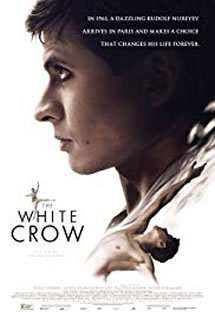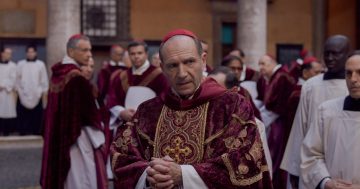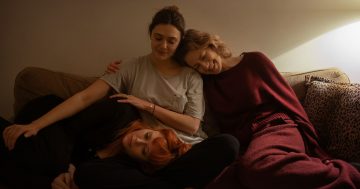Reviewed by Victor Rebikoff.
Director: Ralph Fiennes, BBC Films, MA 127 Minutes.
 The early life of Russian ballet dancer Rudolph Nureyev and his renowned defection to the West is dramatically brought to the big screen by British actor/filmmaker Ralph Fiennes (‘Spectre’) in his superbly directed biopic of the legendary superstar.
The early life of Russian ballet dancer Rudolph Nureyev and his renowned defection to the West is dramatically brought to the big screen by British actor/filmmaker Ralph Fiennes (‘Spectre’) in his superbly directed biopic of the legendary superstar.
The movie opens with the Leningrad Dance Academy teacher Alexander Pushkin (Fiennes) being interrogated by a Soviet official on the reasons behind the Nureyev (Ukrainian dancer Oleg Ivenko) defection before the story switches to his difficult childhood.
At an early age, Rudolph was an aspiring dancer even in his youthful years exhibiting arrogance and rudeness to everyone, deliberately breaking the rules and being dismissive of restrictions set by Soviet officials.
After arriving in Paris with the Kirov Ballet troupe in 1961 he manipulates Pushkin into becoming his instructor, including having his wife Xenia (Russian actress Chulpan Khamatov) care for him by bringing him soup and later providing sexual favours.
As a rising star Nureyev is determined to enjoy Paris’s social life particularly with the soft-spoken Clara Saint (Adele Exarchopoulos – ‘Orphan’) in addition to developing a homosexual relationship with the East German dancer Teja Kremke (Louis Hofman – ‘Dark’).
Nureyev’s social activities together with his personal relationships are soon raised by the chief Soviet minder Vitaly Strizhevsky (Russian actor Aleksey Morozov), deciding at the airport before the troupe’s departure for London that he must return to Moscow.
This sudden change of plans forces Nureyev to contact his friend Clara, with connections in the French Government, enabling her to seek a speedy asylum for him against the frantic actions of the Soviet officials.
Fiennes’ film on the celebrated Russian ballet dancer is both enjoyable as it is entertaining, using black and white scenes to depict Nureyev’s early childhood, recounting his relationship with his mother and then his father as a returned soldier.
The major highlight in ‘The White Crow’ (meaning a phenomenon) is the stand-out performance of Ukrainian ballet dancer Oleg Ivenko in his first feature film, who not only resembles the legendary dancer in looks but also in mannerisms.
Although the movie can be described as a taut thriller considering the events leading to Nureyev’s defection, it is disappointing the biopic did not cover his collaboration with Dame Margot Fontaine and the latter part of his life.
Vic’s Verdict: 3 ½ Stars





